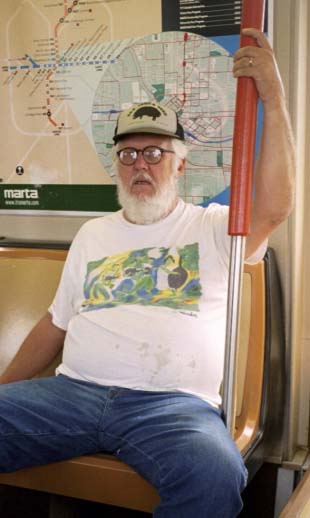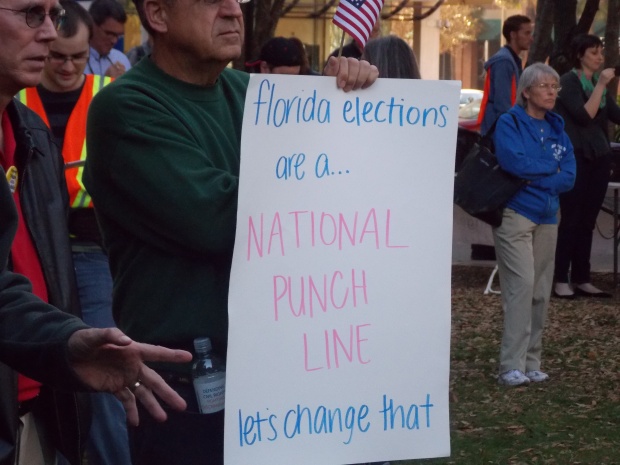Notes from the Aquifer, Part I
William de Kooning painted with Alzheimer’s. And to me, Grandma Moses’ work has a falling off, at the end. No reason you shouldn’t be able to write novels with Alzheimer’s.
– from “Bukowski Never Did This”
The first time I had the distinct pleasure of reading the work of below-the-underground Florida writer Jack Saunders was at a used bookstore in Sarasota. I had come across a book called Forty. My version was published by a small Delray Beach-based press, which I think is what got my attention, though it was originally put out by Popular Reality, who achieved semi-notoriety some years back for publishing Confessions of a Holocaust Revisionist, a screed by an unreconstructed Holocaust denier. Forty is his fortieth novel. It chronicles his trip to Key West for Fantasy Fest ’86 where he meditates on how it’s a bitch to have to work for a living, eats Arby’s with his son and tries to sell copies of his previous 39 books.
It is self-indulgent, self-righteous and laboriously self-referential; it is a wild-ass good read. He has written more than 200 since, mostly in the form of what he calls his “daily typewriting,” thousands of words a day on a loose theme, at his website the Daily Bulletin.
I got in touch with Jack about a year ago via email and we had a nice conversation, mostly about what it’s like to live in Parker (pop. 4,317) and what it’s like to write dozens of books every year for a readership that he guesses is in “the high-one, low-two figures.” He ended up sending me a book and some pamphlets that he stapled himself, maybe the sincerest form of flattery, and afterward we began a running interview that I would like to share a little slice of with you, reader, annotated where useful.

“America’s greatest living unpublished, or underpublished writer, perhaps the greatest unpublished, or underpublished American writer ever.” – Jack Saunders, on Jack Saunders
Q: How did the job fair go Friday?
A: About like you’d expect. A lot of up-tight job-seekers.
Casting pearls before swine.
Of course, that sums up American letters, to me. Casting pearls before swine.
They don’t want to hear what you have to say.
Unless they do. But who would want to write that? It’s as bad as having a job.
Q: Are the apparatchiks [a perennial bugaboo in Saunders’ oeuvre, shares qualities with the Man] the enemy, or are they just agents of the enemy?
A: Fran Lebowitz said in the Soviet Union, capitalism triumphed over communism. In this country, capitalism triumphed over democracy.
The company is the enemy. More precisely, the corporation.
The apparatchiks are ticketpunchers, managers, people who rise in the organization, getting their ticket punched at every stop. I should add ticketpuncher to my glossary [many of his works contain a guide to his idiosyncratic vocabulary].
Careerists are the enemy. University writing programs train careerists.
To me writing is a call, a vocation, and one of the things a person with a call does is act out of principle, expose and resist expediency. If you do that in school you won’t make it through. You will be selected out.
In Disciplined Minds: A Critical Look at Salaried Professionals and the Soul-Battering System That Shapes Their Lives, Jeff Schmidt writes,
“The prospect of failing the qualifying test frightens the student, even the student who is best at answering the kind of questions used on the test. The student is frightened because his desired future as a professional in his field of interest is at stake. But he is also frightened because society does not guarantee his material security (except at a life-shortening subsistence level). It seems possible for the individual, if suddenly of no value to employers, to go overnight from a job to walking the streets, from being somebody to being nobody, from living in the suburbs to living on skid row, left to struggle for survival among the desperate at the bottom of society. It doesn’t matter that such individual downfall is very unlikely; by simply featuring the possibility, the system announces the fundamental insecurity of the individual. This insecurity unrelentingly haunts the student studying for the qualifying test. The student sees professional training as his chance for a secure future, with status and nonalienating work, his life free from the threat of a nightmarish trip to the bottom of the heap. An important part of his past is also riding on the qualifying test, because no matter how many years he has vested in preparation, coming close to passing is worth nothing in terms of attaining professional status. The years of preparation go down the drain along with the hoped-for career.”
[Not a bad point.]
Q: You talk about Lévi-Strauss and other leftist intellectuals here and there; are you a Marxist?
A: I’m not a Marxist. I’m not even a leftist. I’m a writer who read Lévi-Strauss in college, as an anthropology major, and was attracted to French structuralism rather than cultural evolutionism or historical particularism or whatever the reigning dogma was.
French structuralism was a dogma too.
Derrida and Paul De Man dancing at the edge of abyss.
It was dancing.
Q: What was your dad like?
A: Middle class.
He was college-educated. He taught Sunday School. He was a veteran of WWII. He had GI insurance, tried graduate school on the GI Bill but already had a family, the FHA helped him buy a house, or the VA, he had health insurance, at work, I think he died before he drew much social security and I think he might have used private insurance before he was on Medicare. But social security and Medicare kept him from having to take in his parents when they got old. He was a Democrat when Florida was Democratic but voted for Ike because Adlai Stephenson was too liberal for him. I hate to think Humphrey was too liberal and he voted for Nixon, but I don’t know. He was mayor or city councilman in Delray Beach during the civil rights era and was a moderate who smoothed troubled waters. Black civil rights leaders respected him.
I loved him but we didn’t agree on much. I think he feared for me, with my opposition to authority. After I had children I saw I was more like him than I realized.
I despise hypocrisy, shallowness, deceitfulness, and much of the can-do ethic that lets people hold their nose and put their shoulder to the grindstone. He saw that that would hold me back and make me dissatisfied with my lack of progress. Make me angry. Bitter, even.
Q: Why do you write about your own writing so much?
A: Writing is how I understand who I am and what I am about.
Why am I banging my head against the brick stone wall of the world’s indifference? Do I want to be abused? Am I an injustice collector? Would I rather be a failure than successful? Am I just another whiner, a sore loser who can’t hack it?
Q: Do you have to speak Spanish to truly understand the nature of Florida?
A: If you lived in Delray Beach when 28,000 Haitians moved in you needed to speak Creole. Or whatever the patois was called.
New York is the capital of Puerto Rico, Miami is the capital of Cuba, Delray Beach is the capital of Haiti.
Todd Solondz makes movies about Florida.
He writes about Jews from the suburbs of New Jersey.
We live in Florida now.
Storytelling, Happiness, and Life During Wartime are about Jews in Florida.
Eating at Arby’s. Richard Grayson writes about Jews in Florida.
King’s Point and Century Village are out west of Delray Beach where there used to be green-bean farms and dairies.
George Costanza’s father can’t run for president of the condo Homeowner’s Association because he was impeached. For being Jerry Stiller.
The call Leisureville Seizureville.
You have to understand old people.
Not just the green park benches in St. Petersburg, but everywhere.
Plus, Disneyworld is the biggest tourist attraction in the world.
You have to understand vacation families, kids wanting what they see on television, sugar, artificial sweeteners, fat, ugly fat, I could stand to lose a little weight.
I’m fat. I look like Bird in a leisure suit.
Bob Weinstock called me Bird.
He recorded Charlie Parker at Prestige Records.
My heros were Charlie Parker, Jackson Pollock, and Lenny Bruce.
More than Kerouac.
Although I consider Jack Kerouac a Florida writer.
I identify with Kerouac.
I’d call my last book, WEWAHTICHKA, FLORIDA WRITER: HEAP DRAGS UP, a book like Vanity of Duluoz, in which he talks about “…5,000 sneering college writing instructors.”
Why do I write about writing?
John D. MacDonald, a Florida writer, told Dan Rowan, “People are interested in the mechanics of a craft. Remember “The Violent World of Sam Huff?”
Writing is what I do.
Writing is what I know.
I know I don’t know, I wrote a how-to book about not knowing how.
Beats me.
I just write 1,000 words a day, seven days a week, and reply to interviews when people ask me questions.
Beats the shit out of me.
Mula me, my home Taegu.
Follow the Trampa Bay Times on Twitter and RSS!
Article on Awake the State over at the Florida Squeeze
Yesterday I covered a gathering of liberals and City Councilwoman Mary Mulhern in the most august part of Tampa apart from the Dairy Joy on Manhattan. Here’s the link:
Dozens Converge on Downtown Tampa to Resist Voter Suppression



